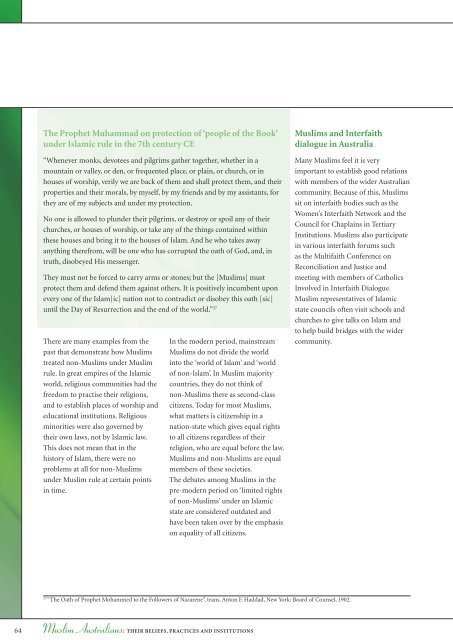Muslim Australians - Religion Cultural Diversity Resource Manual
http://www.islamicglobe.com
http://www.islamicglobe.com
You also want an ePaper? Increase the reach of your titles
YUMPU automatically turns print PDFs into web optimized ePapers that Google loves.
The Prophet Muhammad on protection of ‘people of the Book’<br />
under Islamic rule in the 7th century CE<br />
“Whenever monks, devotees and pilgrims gather together, whether in a<br />
mountain or valley, or den, or frequented place, or plain, or church, or in<br />
houses of worship, verily we are back of them and shall protect them, and their<br />
properties and their morals, by myself, by my friends and by my assistants, for<br />
they are of my subjects and under my protection.<br />
No one is allowed to plunder their pilgrims, or destroy or spoil any of their<br />
churches, or houses of worship, or take any of the things contained within<br />
these houses and bring it to the houses of Islam. And he who takes away<br />
anything therefrom, will be one who has corrupted the oath of God, and, in<br />
truth, disobeyed His messenger.<br />
They must not be forced to carry arms or stones; but the [<strong>Muslim</strong>s] must<br />
protect them and defend them against others. It is positively incumbent upon<br />
every one of the Islam[ic] nation not to contradict or disobey this oath [sic]<br />
until the Day of Resurrection and the end of the world.” 37<br />
There are many examples from the<br />
past that demonstrate how <strong>Muslim</strong>s<br />
treated non-<strong>Muslim</strong>s under <strong>Muslim</strong><br />
rule. In great empires of the Islamic<br />
world, religious communities had the<br />
freedom to practise their religions,<br />
and to establish places of worship and<br />
educational institutions. Religious<br />
minorities were also governed by<br />
their own laws, not by Islamic law.<br />
This does not mean that in the<br />
history of Islam, there were no<br />
problems at all for non-<strong>Muslim</strong>s<br />
under <strong>Muslim</strong> rule at certain points<br />
in time.<br />
In the modern period, mainstream<br />
<strong>Muslim</strong>s do not divide the world<br />
into the ‘world of Islam’ and ‘world<br />
of non-Islam’. In <strong>Muslim</strong> majority<br />
countries, they do not think of<br />
non-<strong>Muslim</strong>s there as second-class<br />
citizens. Today for most <strong>Muslim</strong>s,<br />
what matters is citizenship in a<br />
nation-state which gives equal rights<br />
to all citizens regardless of their<br />
religion, who are equal before the law.<br />
<strong>Muslim</strong>s and non-<strong>Muslim</strong>s are equal<br />
members of these societies.<br />
The debates among <strong>Muslim</strong>s in the<br />
pre-modern period on ‘limited rights<br />
of non-<strong>Muslim</strong>s’ under an Islamic<br />
state are considered outdated and<br />
have been taken over by the emphasis<br />
on equality of all citizens.<br />
<strong>Muslim</strong>s and Interfaith<br />
dialogue in Australia<br />
Many <strong>Muslim</strong>s feel it is very<br />
important to establish good relations<br />
with members of the wider Australian<br />
community. Because of this, <strong>Muslim</strong>s<br />
sit on interfaith bodies such as the<br />
Women’s Interfaith Network and the<br />
Council for Chaplains in Tertiary<br />
Institutions. <strong>Muslim</strong>s also participate<br />
in various interfaith forums such<br />
as the Multifaith Conference on<br />
Reconciliation and Justice and<br />
meeting with members of Catholics<br />
Involved in Interfaith Dialogue.<br />
<strong>Muslim</strong> representatives of Islamic<br />
state councils often visit schools and<br />
churches to give talks on Islam and<br />
to help build bridges with the wider<br />
community.<br />
37<br />
“The Oath of Prophet Mohammed to the Followers of Nazarene”, trans. Anton F. Haddad, New York: Board of Counsel, 1902.<br />
64 <strong>Muslim</strong> <strong>Australians</strong>:THEIR BELIEFS, PRACTICES AND INSTITUTIONS














